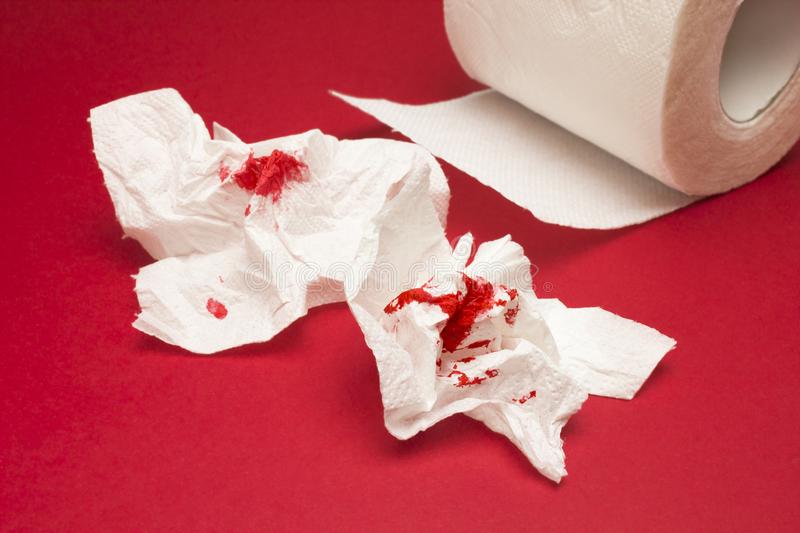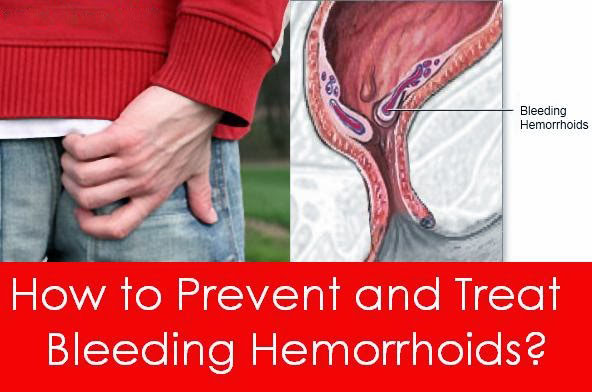Bleeding is a common complication from hemorrhoids. It is usually the first sign of hemorrhoids that a person notices. Causes and signs of bleeding are explained in this article.

Causes of Hemorrhoid Bleeding
Hemorrhoids are varicose dilation of the venous plexus caused by congestion and poor blood circulation that result in increased blood pressure on the vessels of the rectum and they may swell and bulge. As a result, the walls of the vessels thin and thrombosis (blood clots) occur and lead to bleeding. Damaged vessels often cause hard stools. This result in bleeding of different intensity.
Causes of hemorrhoid bleeding:
- Chronical constipation and straining during bowel movement.
- Diarrhea and frequent urge to have bowel movement.
- Inadequate physical activities, i.e. lifting weights, childbearing.
- Genetic disorders (family history of blood vessel diseases).
- Unhealthy diet, eating too much fatty, smoked, salty, fried, spicy, or dry foods, lack of fluids.
- Smoking, excessive alcohol use.
- Particular diseases.
Symptoms of Hemorrhoid Bleeding
In the early stages the patient notices:
- blood on toilet tissues;
- blood in the stool;
- discomfort in the anal region.
These symptoms tend to worsen.
Further symptoms include:
- excessive bleeding;
- painful anal fissures;
- thrombosis;
- fistulae, paraproctitis (inflammation of the cellular tissues around the rectum), carcinomatous and polypoid masses, diverticulum.
If anything of the above occurs, consult your proctologist immediately. Bleeding is becoming more frequent which causes life-threatening blood loss.
Chronical bleeding leads to:
- anemia which is accompanied by paleness, weakness, weight loss;
- low red blood cells and hemoglobin count;
How to Treat Hemorrhoid Bleeding

At the early stages home remedies can help.
Using ice for external hemorrhoids is an effective remedy. Soak some clean gauze in a bowl filled with infusion of antibacterial herbs of your choice (camomile, eucalyptus, tea). Once saturated, fold the gauze quarters and grasp it with your fingers and place in the freezer for 15-20 minutes. Then apply the cold gauze to your bleeding area for 10-15 minutes. Use 3-4 times daily particularly after bowel movements. Be sure to clean your anal area with warm water and soap. For added cooling relief, fold a small cube of ice in the gauze.
Ice suppositories are another remedy for bleeding hemorrhoids and they can be easily prepared at home. Pour some water into molds and put into the freezer. The diameter of such suppository should not be more than 1 cm. Before inserting, lubricate the suppository with petroleum jelly or cream.
There also are collagen sponges, which you can find in the pharmacy. Such sponges stop bleeding immediately and can be used for both external and internal bleeding. For the former, apply them to bleeding source. For the latter, insert them in the rectum.
Sandthorn, propolis, Ichthyol and Hepatrombin rectal suppositories can also be a good remedy for bleeding hemorrhoids. Beside their hemostatic effect, they also decrease thrombus masses and reduce inflammation.
Treatment of advanced hemorrhoids can be performed only by the health professional.
This include the following minimally invasive procedures:
- low-level laser therapy;
- sclerotherapy;
- latex ligation;
- rubber band ligation;
- congelation.
Surgical excision is necessary when treating complicated hemorrhoids.
If you are experiencing any of the above symptoms, see your doctor to determine the diagnosis and plan the treatment.
